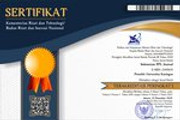THE IMPLEMENTATION OF TASK-BASED INSTRUCTION IN EFL TEACHING SPEAKING SKILL
Abstract
The present study aims to examine the implementation of task-based instruction in EFL teaching speaking skill. It covers the advantages and shortcomings faced by teachers and students in implementing task-based instruction particularly in teaching speaking skill. This study employs a qualitative approach by using a case study design. This study was initiated in one of senior high school in Kuningan covering one class of eleventh grade students. The data were obtained through interview and questionnaires. The findings showed that task-based instruction result in several advantages and shortcomings. It was found that task-based instruction enables students to be more active in teaching and learning process and it was also proven to enhance students’ speaking skill. Meanwhile, there were also some shortcomings identified in this study i.e. teacher’s ability, time availability, and different students’ proficiency level. Therefore, it is suggested to implement task-based instruction in a long time period and in a very proper way by considering different students’ ability inside a certain classroom.
Keywords: task-based instruction; teaching speaking skill; advantages and shortcomings of task-based instruction.
Full Text:
PDFReferences
Aleksandrzak, M. (2011). Problems and challenges in teaching and learning speaking at advanced level. Uniwersytet Im. Adama Mickiewicza W Poznaniu.
Aliakbari, M., & Jamalvandi, B. (2010). The impact of “role play” on fostering EFL learners’ speaking ability: A task-based approach. Pan-Pacific Association of Applied Linguistics, 14(1), 15–29.
Alwasilah, A. C. (2009). Pokoknya kualitatif: Dasar-dasar merancang dan melakukan penelitian kualitatif. Jakarta: PT Dunia Pustaka Jaya.
Bashir, M., Azeem, M., & Dogar, A. H. (2011). Factor effecting students’ English speaking skills. British Journal of Arts and Social Sciences, 2(1).
Branden, K. V. D. (2006). Task-based language education: From theory to practice (1st ed.). Cambridge: Cambridge University Press.
Creswell, J. W. (2008). Research design: Qualitative, quantitative, and mixed methods approaches (3rd ed.). Thousand Oaks: SAGE Publications, Inc.
Denzin, N. K., & Lincoln, Y. S. (2000). Introduction: The discipline and practice of qualitative research. In N. K. Denzin, & Y. S. Lincoln, (Eds.), Handbook of qualitative research (2nd ed., pp. 1-29). Thousand Oaks, CA: Sage.
Dunne, M., Pryor J., & Yates, P. (2005). Becoming a researcher: A companion to the research process. Berkshire, UK: Open University Press.
Ellis, R. (2000). Task-based research and language pedagogy. Language Teaching
Research, 4(3), 193-220.
Ellis, R. (2003). Task-based language learning and teaching (1st ed.). Oxford: Oxford University Press.
Harmer, J. (2000). The practice of English language teaching. London: Longman Group Ltd.
Harmer, J. (2001). The practice of English language teaching (3rd ed.). London: Longman Press.
Hasan, A. A. A. (2014). The effect of using task-based learning in teaching English on the oral performance of the secondary school students. International Interdisciplinary Journal of Education, 3(2), 250–264.
Hyde, C. (2013). Task-based language teaching in the business English classroom (Doctoral dissertation). University of Wisconsin, River Falls.
Kumaravadivelu, B. (2012). TESOL methods: Changing tracks, challenging trends. Tesol Quarterly, 40(1), 59–81. http://doi.org/10.2307/40264511.
Larsen, F. D. (2000). Technique and principles in language teaching. Oxford: Oxford University Press.
Littlewood, W. (2007). Communicative and task-based language teaching in east Asian classrooms. Language Teaching, 40(03), 243–249.
Luchini, P. L. (2004). Developing oral skills by combining fluency-with accuracy-focused
tasks: A case study in China. Asian EFL Journal, 6(4), 20.
Malihah, N. (2010). The effectiveness of speaking instruction through task-Based language teaching. REGISTER, 3(1), 85–101.
Muller, T. (2006). Researching the influence of target language on learner task performance. Proceedings from the Asian EFL Journal International Conference, 8(3).
Nunan, D. (1989). Designing task for the communicative classroom. Cambridge:
Cambridge University Press.
Nunan, D. (1991). Language teaching methodology: A textbook for teachers. New York: Prentice Hall.
Nunan, D. (2004). Task-based language teaching. Cambridge: Cambridge University Press.
Oradee, T. (2012). Developing speaking skills using three communicative activities (discussion, problem-solving, and role-playing). International Journal of Social Science and Humanity, 2(6), 533–535.
Prabhu, N. S. (1987). Second language pedagogy. Oxford: Oxford Univ Press.
Richards, J. C. (2008). Teaching listening and speaking from theory to practice. Cambridge: Cambridge University Press.
Rohani, S. (2013). Positive versus negative communication strategies in task-based learning. TEFLIN Journal, 24(2), 158-179.
Ruso, N. (2007). The influence of task-based learning on EFL Classrooms.
Sae-ong, U. (2010). The used of task-based learning and group work incorporating to develop English speaking ability. Thailand: Shrinakhrinwirot University.
Skehan, P. (1996). A framework for the implementation of task-based instruction. Applied Linguistics, 17(1), 38–62.
Skehan, P. (2003). Task-based instruction. Language Teaching, 36, 1–14.
Uraiwan, S. (2010). The use of task-based learning and group work incorporating to develop English ability of Mattayom Suksa 4 students. Srinakharinwirot University.
Willis, J. (1996). A framework for task-based learning. Harlow: Longman.
DOI: https://doi.org/10.25134/ieflj.v4i2.1371
Refbacks
- There are currently no refbacks.

This work is licensed under a Creative Commons Attribution-ShareAlike 4.0 International License.

